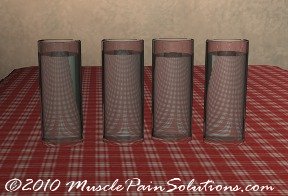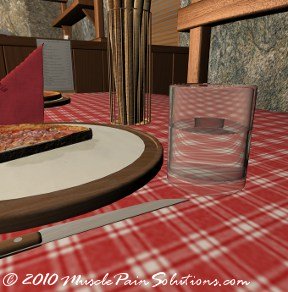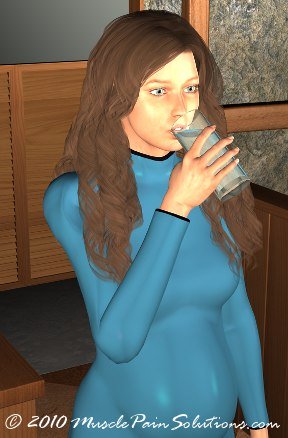What you know...
and what you don't know about the treatment of dehydration
Fortunately, treatment of dehydration is fairly simple... drink more water! It is also important to balance your water intake with salt. Read more to learn how much and when to drink. Moderate and severe dehydration may require IV replacement of fluids. Learn more about the symptoms of dehydration.
How much water do I need in the treatment of dehydration?

To regain hydration, you need to drink water, balanced with salt until your urine runs clear. Take in about 1/8 teaspoon of salt for every 16-20 oz you drink. In more moderately severe cases, it may be helpful to drink a sports drink which has electrolytes and glucose which can help the intestines absorb water. You can also make your own Oral Rehydration Solution from various household ingredients. Visit the Rehydration Project for recipes.
How much water do I need daily to maintain hydration?
According to Dr. Batmanghelidj, author of Your Body's Many Cries for Water, the absolute bare minimum amount of water to maintain hydration, is six to eight 8 oz glasses of water per day. This is only sufficient if the environment is not dry, and you are not exercising, and have no additional need for water. Most people need 8-10 glasses of water per day or more. Requirements for water increases in many circumstances including the following:
- pregnancy and breast feeding
- living at high altitudes
- hot weather
- exercise
- during long air flights
- during illness and fever
- vomiting and diarrhea
- colds and flues
- diabetes
- kidney disease
- when drinking alcohol
- cystic fibrosis
- other chronic illnesses
Is there any special timing for drinking water?

Thirst should always be quenched, regardless of timing. However, there is an optimal timing for regular water intake. Dr. Batmanghelidj, who spent his entire medical career on researching dehydration, observed that there are several times during the day that are the most important for taking in water. First thing in the morning, you should take in at least 2 glasses of water. Then 30 minutes before each meal , you should drink 1-2 glasses of water, and about 2 hours after a meal, another glass. Optimally, only about 4 oz of water should be drunk with a meal, unless you are thirsty. This is because it dilutes the acid and enzymes needed to break down your meal. The rest should be spread throughout the day. I was able to eliminate heartburn that I had experienced since elementary school, by increasing my water intake slightly and changing the timing of my water intake to 15-30 minutes before each meal. (I also temporarily took some enzymes and HCl.) The emphasis here is providing your body with enough water to be able digest properly, so that the food doesn't sit there and rot in your stomach, creating acids that come back up your esophagus.
How much salt?
A good rule of thumb is about 1/2 teaspoon of added salt or three grams of salt for every 10 glasses of water. The best is unrefined sea salt, like Celtic Sea Salt or Redmond's Real Salt which have other minerals as well as sodium, and do not have additives like aluminum. Potassium is also important, so a fruit or some orange juice can be taken daily, but not too much, because this will throw off the balance of sodium to potassium and can increase histamine production.
Treatment of Dehydration

If you have not been drinking enough or any water for a long period of time, you need to slowly increase your water to make sure your kidneys are working. As you add glasses of water, make sure that you are urinating the same amount that you are drinking. At first, you may feel like you are over hydrated because of the mechanisms that the body has set up to prevent water from permeating less vital areas, but slowly your body will begin to rehydrate, and eventually you will start to feel the effect of being fully hydrated. When you don't drink enough water, the body collects salt to try to keep as much as possible, creating edema. So as you begin to rehydrate, give your body some time to flush the salt out. Then in a few days, being adding salt as detailed above. If your ankles begin to swell, reduce your salt intake for a few days, but increase your water intake until the swelling disappears. You should also increase your exercise as muscle activity will draw the swelling back into the circulation.
Treatment of Dehydration Summary
- Drink 8-10 glasses of water per day
- Add 1/2 teaspoon of salt to your food per day
- Treat pain, fatigue, and other dehydration symptoms with increased water and salt intake
For reasons people become chronically dehydrated, visit Causes of Dehydration.
Return from Treatment of Dehydration to Dehydration Effects.
Return from Treatment of Dehydration to Home
.